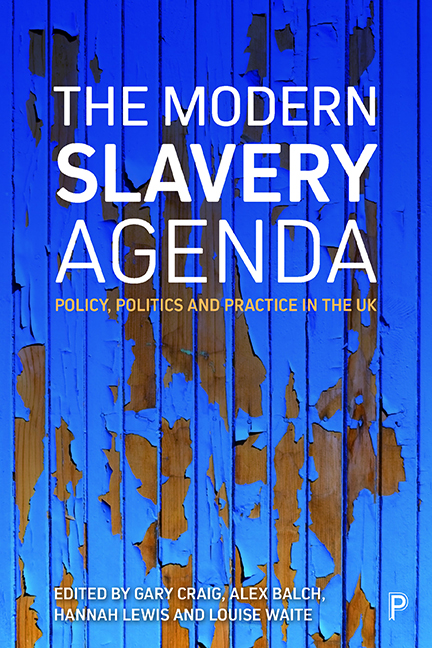Book contents
- Frontmatter
- Dedication
- Contents
- List of tables, figures and boxes
- Notes on contributors
- Editorial introduction: the modern slavery agenda: policy, politics and practice
- one Modern slavery in global context: ending the political economy of forced labour and slavery
- two The UK’s response to modern slavery: law, policy and politics
- three Defeating ‘modern slavery’, reducing exploitation? The organisational and regulatory challenge
- four Class Acts? A comparative analysis of modern slavery legislation across the UK
- five Child trafficking in the UK
- six Human trafficking: addressing the symptom, not the cause
- seven Still punishing the wrong people: the criminalisation of potential trafficked cannabis gardeners
- eight Modern slavery and transparency in supply chains: the role of business
- nine Migrant illegality, slavery and exploitative work
- ten The UK’s approach to tackling modern slavery in a European context
- Index
one - Modern slavery in global context: ending the political economy of forced labour and slavery
Published online by Cambridge University Press: 20 April 2022
- Frontmatter
- Dedication
- Contents
- List of tables, figures and boxes
- Notes on contributors
- Editorial introduction: the modern slavery agenda: policy, politics and practice
- one Modern slavery in global context: ending the political economy of forced labour and slavery
- two The UK’s response to modern slavery: law, policy and politics
- three Defeating ‘modern slavery’, reducing exploitation? The organisational and regulatory challenge
- four Class Acts? A comparative analysis of modern slavery legislation across the UK
- five Child trafficking in the UK
- six Human trafficking: addressing the symptom, not the cause
- seven Still punishing the wrong people: the criminalisation of potential trafficked cannabis gardeners
- eight Modern slavery and transparency in supply chains: the role of business
- nine Migrant illegality, slavery and exploitative work
- ten The UK’s approach to tackling modern slavery in a European context
- Index
Summary
Introduction
In 2017, the International Labour Organization (ILO), together with the Walk Free Foundation and the International Organization for Migration (IOM), estimated that there were 40.3 million people in slavery worldwide, doubling its 2012 estimate of 20.9 million (Kelly 2017b). By any reckoning, the scale of 21st-century slavery is daunting. It is also perplexing given the efforts of 19th-century figures, such as Lincoln, Wilberforce, Buxton and countless others, to bring this human rights abuse to an end. However, there is a simple reason why slavery is still such a considerable feature of the contemporary world. It is that we, as a human society, still permit it to exist. Such an assertion may seem at odds with the considerable body of international anti-slavery law, such as the 1926 Slavery Convention and the 1956 Supplementary Convention on Slavery, and the substantial body of national law, such as the UK Modern Slavery Act (MSA) and Articles 23 and 24 of the Indian Constitution, which prohibit trafficking in human beings and child labour.
However, what the black letter of the law says is one thing. How that law is interpreted, or whether it is enforced, can be something else entirely. So, when considering the question of how there can still be so much slavery in the world when there are so many laws banning it, it is perhaps useful to consider the idea of political economy. For the purposes of this chapter, the term ‘political economy’ is taken to mean the laws, policies and customs that we, as human societies, use to govern business, trade, employment, income and wealth. In many parts of the world, the principles of human rights are not foundational to the conduct of these issues. So, when viewed from this perspective, it can be argued that slavery has become not so much banned, but rebranded, that is, slavery persists across the world but is simply called by other names, facilitated by different laws (by omission or commission) or simply ignored by those with the power to end the diverse practices of contemporary slavery.
The chapter will begin by setting out the root causes of slavery, and demonstrating the fundamental role of the failure of the rule of law in enabling slavery to persist.
- Type
- Chapter
- Information
- The Modern Slavery AgendaPolicy, Politics and Practice in the UK, pp. 29 - 46Publisher: Bristol University PressPrint publication year: 2019



